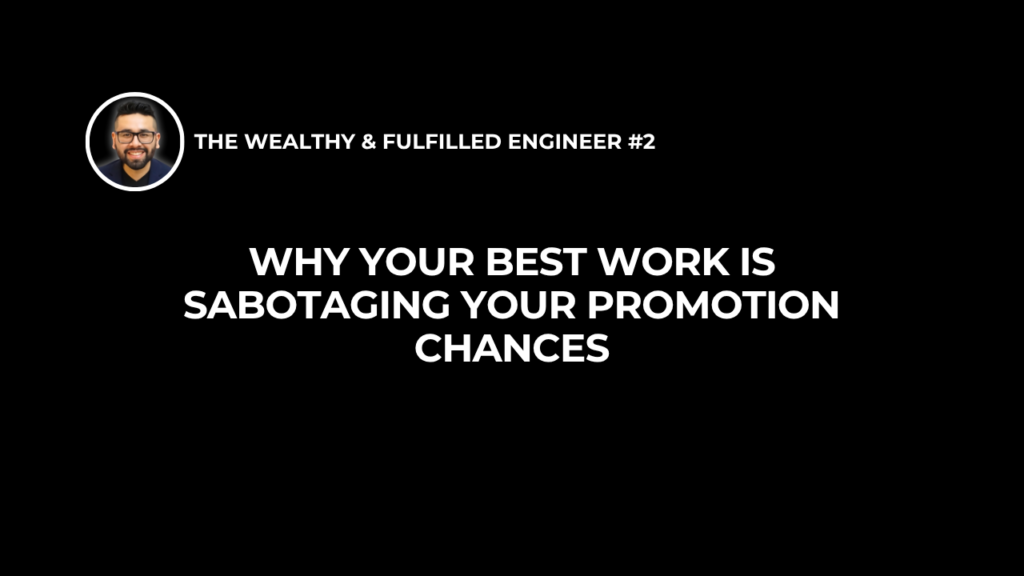Here’s a painful truth:
The hardest-working engineers can get passed over for promotion. That’s not a typo.
Imagine being a brilliant engineer, and get skipped over for a senior role.
You optimized three manufacturing processes, saved the company $400K annually, and mentored two junior engineers.
However, all of this didn’t matter. The promotion went to someone with half your impact but twice the visibility, and worse…someone who only entered the company two months ago.
Your mistake?
Assuming that good work speaks for itself.
It doesn’t.
(This actually happened to someone I know, a software engineer).
The Fatal Flaw in “Just Do Good Work”
Most engineers follow the same (now broken) promotion strategy:
“Keep your head down, deliver excellent results, and wait for recognition.”
This worked in 1995.
But in 2025, it fails miserably.
Today’s managers juggle 12+ direct reports, attend 25+ meetings per week, and make promotion decisions based on incomplete information.
They literally can’t track everyone’s contributions.
When promotion season arrives, they remember the engineer who sent quarterly impact summaries, not the one who quietly fixed the critical bug at 2 AM.
Have you ever heard the saying “out of sight, out of mind?”
This is the reason you’re not getting promoted.
Introducing the P.A.C.K. Framework: How to Package Your Work for Promotion
As opposed to hoping someone notices your value.
Start proving it systematically.
P – Problems You Solved
Document every significant challenge you tackled, not just what you built. Instead of “Developed new API endpoints,”
write “Solved system timeout issues causing $50K monthly losses by redesigning API architecture.”
Change your mindset from “tasks you completed” to “what it helped the business/project accomplish.” What does your accomplishment mean in terms of money and time savings?
A – Actions You Took
List your specific contributions, especially leadership moments. Document it somewhere.
For example, “Led cross-functional team of 5 to implement a solution under tight deadline” carries more weight than “participated in a project.”
C – Costs You Saved/Revenue You Generated
Quantify everything possible.
Time saved, costs reduced, efficiency gained, risks mitigated. If you can’t measure it, estimate conservatively and note your methodology. It’s OK to estimate, so make assumptions.
K – Knowledge You Shared
Track mentoring, documentation, training, and process improvements. These show leadership potential, exactly what managers look for in promotions.
Focus not just on helping others, but also help yourself 🙂
Two Engineers, Same Skills, Different Outcomes
Engineer A: Brilliant coder, ships features on time, stays late when needed. Keeps mental notes of achievements. Gets reviewed as “solid contributor, meeting expectations.”
Engineer B: Same technical skills, but maintains a monthly “wins document” using P.A.C.K. Sends quarterly impact summaries to manager. Stays visible and volunteers for high visibility projects. Gets promoted 18 months faster.
The difference? Engineer B treated career advancement like an engineering problem requiring systematic documentation and communication.
You Might Say “What If I’m Not Naturally Self-Promotional?”
You don’t need to become a corporate politician or abandon your engineering identity.
Think of documentation as debugging your career. You wouldn’t troubleshoot a system failure without logs; why navigate promotion discussions without impact records?
Don’t get this wrong; the goal isn’t bragging. It’s providing your manager and leadership with accurate data to advocate for your advancement.
You need to be your own best cheerleader.
Bottom line: In engineering, we measure system performance to optimize it. Your career deserves the same systematic approach.
Keep moving forward,
Alex
P.S.
Ready to stop being the best-kept secret?
→ Book a 60-minute strategy call if you’re ready to accelerate your promotion timeline with a proven system? Learn more here
→ Follow on LinkedIn for daily career advancement tips specifically for engineers. Connect here

I’m a dad, husband, engineer, online business owner, and mentor. After overcoming poverty, paying off $215,000 in debt, and climbing the corporate ladder, I built a online education platform while working my full-time career. My goal is to help engineers build wealth through career and income strategies, debt elimination, and smart money moves.
